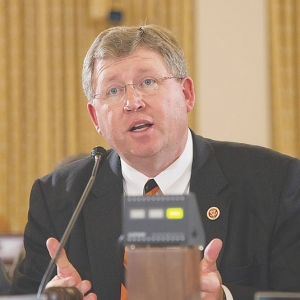TWO BIG American livestock groups say they will fiercely oppose a compromise farm bill agreed to by House of Representatives and Senate agriculture leaders that includes an end to direct subsidies to farmers in favour of beefed-up crop insurance.
The National Cattlemen’s Beef Association and the National Pork Producers Council almost instantly announced their opposition because the bill does not contain a fix for mandatory country-of-origin labeling (COOL) that would avert retaliatory tariffs on a broad range of US products by Canada and Mexico.
The cattlemen say the bill, which President Obama signed into law late last week, does not address the priority issues for its members.
“We are calling on Congress to fix the mistakes they have made, mistakes that are costing cattlemen and women money every day,” president Scott George says in a statement.
“Mistakes like mandatory country-of-origin labelling (MCOOL), which has already resulted in steep discounts to our producers and caused prejudice against our largest trading partners. This programme was created without the consent of producers and has been a failure by every measure.
“This farm bill is foundationally flawed and the livestock sector is standing shoulder-to-shoulder in opposition to a farm bill that will cause greater harm to rural America.”
George told a teleconference the bill is a slap in the face for the livestock industry.
The National Pork Producers Council complains the bill fails to address three issues facing the US pork industry. It wants a permanent fix to the so-called GIPSA rule -- the Grain Inspection, Packers and Stockyards Administration legislation regulating their activities -- as well as changes to COOL to prevent retaliation against US pork producers, and an amendment to prevent states from mandating production practices across their boarders.
“Because of the detrimental effect a farm bill without these amendments will have on the US pork industry, the National Pork Producers Council is asking for your help to oppose the Farm Bill,” it says in a note to its members.
But National Farmers Union president Roger Johnson sent a letter to Senate majority leader Harry Reid and Speaker of the House John Boehner calling for the bill to be passed.
“Farm bill conference committee members have agreed to a compromise that will provide farmers, ranchers, rural residents and America’s consumers with policy certainty over the next five years,” Johnson said.
The NFU says it is pleased with the bill for a variety of reasons.
“The bill includes fixed-reference prices to provide assistance to farmers only when truly necessary,” Johnson says.
“It provides a strong crop insurance title and about $4 billion in livestock disaster assistance. The bill increases funding for the farmers market and local foods promotion programmes and related initiatives.
“We are also encouraged by the inclusion of robust mandatory funding levels for renewable energy programmes. We’re also happy that the bill preserves the ability of American family farmers and ranchers to distinguish their products in the marketplace through the existing country-of-origin labeling (COOL) law.”
The National Milk Producers Federation is supporting the bill.
President and chief executive Jim Mulhern says the federation worked with agriculture leaders in the House and Senate to develop a margin insurance programme that will offer dairy farmers an effective safety net.
“Despite its limitations, we believe the revised programme will help address the volatility in farmers’ milk prices, as well as feed costs, and provide appropriate signals to help address supply and demand,” he says.
The legislation had to be passed by both the House of Representatives and the Senate before being signed by President Obama.
The House and Senate agriculture leaders said in a statement the legislation provides certainty to the 16 million Americans whose jobs depend on agriculture while streamlining and consolidating numerous programmes to improve their effectiveness and reduce duplication, and cutting down on programme misuse.
Rep. Frank Lucas (R-OK), chairman of the house agriculture committee, says the bill also strengthens the commitment to support farmers and ranchers affected by natural disasters or big economic losses, and renews a national commitment to protect land, water and other natural resources.
“We are putting in place sound policy that is good for farmers, ranchers, consumers, and those who have hit difficult times,” he said.



















